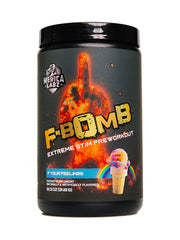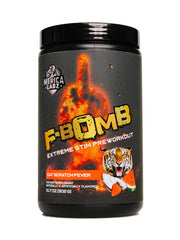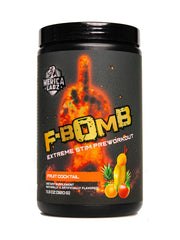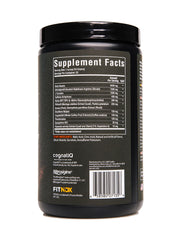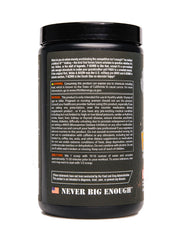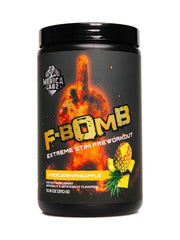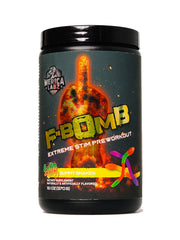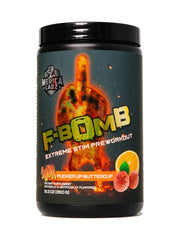
What do you do when merely annihilating the competition isn’t enough? You deliver a biblical ass kicking – the kind that forces future scholars to question whether its fact, fiction or the stuff of legends - then pee on all their stuff to demonstrate your dominance. You build a weapon capable of wiping life off the face of the earth while also flipping everyone off with a middle finger big enough to see from space.
F Bomb is like that, except its pre-workout with enough stimulants to make your grandmother yell F#$@ in a crowded church. If the original Red, White & BOOM was the U.S. military pre-WWII and A Bomb is atomic warfare, F Bomb is the Death Star on steroids. It’s time to get pissed ‘Merica. It’s time for war.
† These statements have not been evaluated by the Food and Drug Administration. This product is not intended to diagnore, treat, cure, or prevent any diseases.
Beta Alanine
Carnosine is a bit of an odd duck: we know that it is crucial for muscle function, and that dietary sources of carnosine are essential, but we don’t know precisely how it’s working. Moreover, for decades, we had no idea how to increase intramuscular concentrations, as exogenous carnosine sources degraded in the body so fast as to be effectively useless.
Enter beta-alanine. Simply a different iteration of one of the amino acids that comprises carnosine itself (alanine), beta-alanine has proven to be the most effective means of significantly increasing intramuscular concentrations of carnosine – and therefore of promoting all of carnosine’s various beneficial effects on muscle performance. If that weren’t enough, beta-alanine has also demonstrated beneficial physiological effects independent of its parent compound. In order to understand why, though, we need to first understand some of the basics behind carnosine itself.
Carnosine, a cytoplasmic dipeptide synthesized from the precursors L-histidine and l-alanine, is present in high concentrations in skeletal muscle and plays a pivotal role as a, “chemical buffer” in myocytes (muscle cells). It has long been known that carnosine concentrations are highest in glycolytic, rather than oxidative muscle fibers (roughly speaking, explosive vs., endurance muscle fibers, respectively), and thus long hypothesized that this amino acid is required for sustained performance during supramaximal exercise. Recent research demonstrates that carnosine exerts its physiological effects in long hypoxic (low oxygen) drives by functioning as a high-capacity pH buffer in skeletal muscle, preventing the pH ratio of plasma from dropping too low – and therefore preventing crucial pH-dependent processes such as protein synthesis from being inhibited by acidosis.
Despite its critical role in skeletal muscle anaerobic performance, intramyocellular synthesis of carnosine is rate-limited by the availability of l-alanine. Unfortunately, the majority of literature demonstrates that attempting to increase intramuscular levels of carnosine via either direct carnosine or alanine supplementation is largely ineffective due to carnosine/alanine pharmacokinetics. Enter beta-alanine. Research with beta-alanine demonstrates consistent and dose-dependent increases to intramuscular carnosine concentrations with beta-alanine supplementation, with certain studies showing an increase of 40-60% with chronic administration. These same literatures reveal a synergistic effect of exercise on beta-alanine supplementation, whereby the muscle adaptive changes associated with resistance training promote further intramuscular carnosine production in response to beta-alanine supplementation.
In simpler language, this essentially means that beta-alanine is a dietary supplement that promotes its own effects in combination with exercise. As you exercise, you simultaneously intensify beta-alanine’s physiological actions – both directly, as well as in the production of intramuscular carnosine. Once ingested, beta-alanine’s exercise-specific beneficial activity is well-established. Elevation of intramuscular carnosine content via beta-alanine supplementation has been shown to improve performance in the following ways.
- Both acute and chronic increases in total work capacity, measured by total volume during exercise sessions.
- Highly significant increases to TTE (total time to exhaustion), one of the most accurate and comprehensive measures of endurance. In various trials, beta-alanine supplementation has been shown to increase TTE by upwards of 20%.
Increases to total muscle power output in both acute and chronic trials, suggesting that beta-alanine’s most significant benefit is to those engaging in power-dependent resistance training.
In total, a significant body of research exists to suggest that beta-alanine may significantly increase muscle power output, strength, training volume and output, overall performance in hypoxic (oxygen-deprived) conditions and peak VO2 max (oxygen holding capacity).
These myriad benefits make beta-alanine both one of the most-studied, and most well-rounded dietary supplements. Beta-alanine not only has direct, actionable physiological effects, but also promotes critical muscle physiologic adaptations that promote its own effects.
Nitrosigine® (Inositol-Stabilized Arginine Silicate)
Nitrosigine® is a patented blend of arginine, inositol, and potassium silicate that has been clinically studied and shown to be an innovative combination in the realm of nitric oxide production. This unique blend of ingredients that makes up Nitrosigine® has a specific processing component that increases arginine’s bioavailability, an ingredient known for having poor bioavailability. Arginine as a lot of us know is a precursor to nitric oxide, a powerful vasodilator. Arginine is converted into NO within the body with the help of an enzyme called Nitric Oxide Synthase, in which L-Citrulline is a byproduct of this process. So Nitrosigine® solves a few things, it creates a much more bioavailable form of arginine that the body can use to produce nitric oxide, and it can do so with a much smaller dosage than what might be needed from pure L-Citrulline. In one study, researchers were specifically studying arginase levels in their test subjects through analyzing blood plasma arginine levels after several days of product administration. What these researchers concluded was that the Nitrosigine® administered subjects had lower levels of arginase in the plasma. These results support that Nitrosigine® improves bioavailability by stopping the metabolic breakdown of arginine.
But enough about bioavailability, what does this mean in terms of performance in the gym? In addition to this, the specific blend of ingredients in Nitrosigine® can extend the life of your pump as well. Why is this important? Longer and more efficient pumps is a great piece to the puzzle when looking to optimize maximal physical performance in the gym. The nitric oxide boosting effects of Nitrosigine® kick in quickly (usually within the first 30 min) and last a long time (sometimes as long as 1.5 hours). So, this longer lasting pump can equate to much more efficient work in the gym and placing the muscle cells in an environment to promote hypertrophy. So, if you’re looking for a tried-and-true ingredient that can increase muscle pumps and keep them around, Nitrosigine® is one that can be relied on.
L-Tyrosine
Tyrosine is amongst a class of amino acids known as ‘non-essential’ amino acids, so called because the body can produce them endogenously, and it is therefore not essential to consume dietary tyrosine. That said, tyrosine is also what is known as a conditionally-essential amino acid; conditionally-essential because, along with glucose and ammonia, the synthesis of tyrosine additionally requires adequate levels of phenylalanine. Once synthesized, tyrosine is one of the most critical amino acids, given its prominent role as a substrate in the synthesis of the catecholamines dopamine, norepinephrine, and epinephrine, in addition to both T3 (triiodothyronine) and T4 (thyroxine) thyroid hormones.
In studies on stress modulation, tyrosine has been demonstrated to reverse stress-induced norepinephrine depletion and the depressant-behavioral effects normally associated with it. In simpler terms, tyrosine may, in certain conditions, dampen the extent to which norepinephrine is removed from the bloodstream during a stress event. In simpler terms still, tyrosine may help to mitigate the sense of depletion and fatigue felt at the end of a workout.
Tyrosine may also play important metabolic functions, mostly related to its role in synthesizing compounds which stimulate the nervous system. While not traditionally considered a sympathomimetic amine, studies which have coadministered tyrosine and stimulants demonstrate a synergistic effect. These studies suggest that tyrosine may potentiate the effects of both endogenous and supplemental norepinephrine and its mimetics (in the case of exogenous use) with respect to lipolysis, thermogenesis, and energy expenditure. Meaning that tyrosine may play a role in assisting norepinephrine to break up triglycerides and increase body heat transiently.
Caffeine Anhydrous
Caffeine is one of the most widely consumed, and perhaps one of the most reviewed, psychoactive compounds. Its physiological effects in a range of areas have been well-documented, including exercise performance, information processing, alertness and mood enhancement, attention, and awareness, along with its anti-lipogenic and lipolytic abilities.
Most importantly to FBOMB, caffeine has been shown to have significant effects on exercise performance, even with ingestion in servings as small 3 to 9mg/kg/bw/day (the equivalent of 2 cups of standard coffee, for a 170lb male). In endurance training, possible explanations for caffeine’s performance-enhancing effects lie in its metabolic effects on both lean and fat tissue. It is suggested that caffeine’s potent lipolytic (the breakdown of fat tissue into fatty acids) and oxidative (the actual ‘burning’ of fat) action allow the body to utilize these sources during prolonged submaximal exercise. Consequently, muscle glycogen is spared and available for use later in the training session. Practically speaking, this means caffeine is forcing your body to preferentially use fat tissue as a fuel source, while sparing the glycogen which gives you the full-bodied look!
In short-term exercise, caffeine’s demonstrated role in the inhibition of cyclic AMP- phosphodiesterase’s (PDE), adenosine receptor antagonism, and adrenoreceptor agonism come into play. These three pathways collectively stimulate lipolytic activity, boost fat metabolism, increase metabolic rate and energy expenditure, and regulate the body’s thermogenic activity. The practical results of activating these pathways are increases to the contractile force of both cardiac and skeletal muscle (harder flexion), an increase in energy expenditure (freeing up more caloric energy to be used in contraction), dilation of vasculature (better blood flow), and improvements to both nitrogen retention and skeletal muscle protein synthesis (key components to muscle building).
Alpha GPC 50% (L-Alpha-Glycerylphosphorylcholine)
Of the known choline pro-drugs or precursors, Alpha GPC appears to have exert the greatest influence on circulating choline levels. Choline is an essential nutrient involved in numerous metabolic pathways, including DNA regulation and repair, protein function, and metabolism. Perhaps most importantly, the critical neurotransmitter acetylcholine is produced directly from free choline via cholinergic neurons. Acetylcholine is then responsible for several functions itself, most crucially as the compound which induces muscular contraction, and as the neuromodulator partially responsible for modulating risk/reward, arousal, and enhancing memory.
Choline’s essential role as a substrate for acetylcholine, and therefore brain development, is well documented in animal models. These studies demonstrate that levels of free maternal choline have a direct and fundamental impact on prenatal brain development, with the enhancements or deficits lasting into adulthood. Choline’s enhancing effect is particularly prominent in the hippocampus. In humans, the hippocampus is primarily involved in the consolidation of memory (taking short, episodic memory and translating it into long-term memory) and the learning of new information. Acetylcholine is a critical component in these processes, as mentioned above, and choline may therefore play a potential role in these processes as well by providing the substrate for acetylcholine synthesis.
Whether through these, or other independent mechanisms, a recent trial using Alpha GPC demonstrated a statistically significant increase to power output. In a placebo-controlled, double-blind, randomized trial, 14 healthy volunteers, split into an Alpha GPC or placebo group, were tested on various exercises. In comparison to the placebo group, the Alpha GPC group experienced a 14% increase to bench press. The researchers hypothesize that the peak power increase was the result of a substantial acute increase to growth hormone, one of the observed effects of Alpha GPC supplementation.
FitNox® (Moringa oleifera Extract (Leaf), Punica granatum Extract (Peel), Kaemferia parviflora Extract (Root))
FitNox® is a relatively new, 100% plant based non-stimulant combination of three botanical components that have been shown to have a positive impact on vasodilation and endurance by increasing nitric oxide levels within the body without the use of nitrates. These three botanicals, Moringa oleifera Extract (Leaf), Punica granatum Extract (Peel), Kaemferia parviflora Extract (Root), have been scientifically shown to boost levels of nitric oxide by upwards of a staggering 336% thus promoting significant blood flow and nutrient delivery to working musculature.
One study, although very short (1 day) showed that after oral intake of 250mg of FitNox®, nitrate and nitrite levels in blood serum and saliva were elevated within one hour of intake. It is also to be noted that nitrate and nitrite levels in blood and saliva remained significantly elevated up to 10 hours post single dose. A separate, longer study (22 days), was also performed to evaluate the longer-term benefits of FitNox® on endurance before and after exercise. Still using a single dose, 250mg, concentrations of nitrate increased 31% before exercise and 45% after exercise. Nitrite levels also increased 49% and 47% respectively in this same study. These results can show that long term supplementation with FitNox® can lead to longer lasting elevated levels of nitric oxide over an extended period for improved blood flow and better muscle pumps.
Its well known that increased nitric oxide increases in the bloodstream can lead to better muscle pumps, vasodilation, nutrient delivery, endurance, peak power, reduced fatigue, and better feelings of well-being. With FitNox® studied outcomes through both short term and long term evaluation, its addition to ‘Merica Labz FBOMB is going to have you reaping the benefits of a skin splitting pump for the duration of your workout and up to your next workout so you can keep making valuable gains!
Dicaffeine Malate
Dicaffeine malate, by definition, is two caffeine molecules bonded to a malic acid molecule. What this unique combination does is offer some distinct advantages when combined with caffeine anhydrous, as well as in combination with traditional caffeine. We all know that the benefits of caffeine can include increased energy, enhanced focus and cognitive performance, boosts in metabolism, improved reaction time, etc. What less known are the benefits of malic acid. Malic acid can promote energy production through the Krebs cycle, increase endurance, enhance power output, and help delay muscle fatigue. So, separate these two ingredients offer some wide benefits, but together they can compliment each other a great deal. What dicaffeine malate can offer for an individual is a slow released caffeine source that can eliminate normal jitters, anxiousness, and no crash. This also can lead to a longer lasting caffeine, usually around 6-8 hours, so youll be able to get through your grueling training sessions as well as feel energized post training. Dicaffeine malate can also offer energy replenishment through malic acids role in the breakdown of carbs, fats, and proteins and it can also help reduce caffeine tolerance.
So, caffeine on its own can have a host of benefits from an efficiency standpoint as being a tried-and-true ergogenic aid but with normal caffeine having a relatively fast half-life, we can reap extra benefits from a more delayed release caffeine to our preworkout formulas. It is to be noted that because of the combination of caffeine and malic acid, the % breakdown is 75% caffeine and 25% malic acid. So, the 100mg of dicaffeine malate in ‘Merica Labz FBOMB yields 75mg of active caffeine. With the 400mg of caffeine anhydrous listed above, we have a whopping 475mg of active caffeine in this explosive preworkout!
CognatiQ® (Whole Coffee Fruit Extract) (Coffea arabica)
Cognatiq®, an extract derived from the whole fruit Coffea arabica plant, is a clinically proven ingredient shown to stimulate the production of the neuroprotein, Brain-Derived Neurotrophic Factor (BDNF). BDNF has been shown to be crucial in the development, maintenance and repair of neurons and also protect against neuro-degeneration. One study comparing other coffee, caffeine, and polyphenol compounds, showed that they were not statistically significant in increasing BDNF % compared to Cognatiq®. The unique polyphenol profile found in Cognatiq® showed to be superior in increasing BDNF concentration.
Theobromine
Theobromine, one of the main methylxanthine compounds found in cocoa is primarily effective in the increase of nitric oxide to in the blood stream, which is beneficial to produce the “pump” when ingested pre-workout. Another reaction that can be seen with theobromine is dilation of blood vessels. This can increase blood flow during vigorous exercise leading to increased time to exhaustion but also can pose benefits to individuals who suffer from high blood pressure. Theobromine also has a very high bioavailability and ability to stay in the body for extended periods of time (7-8 hours). Several studies have also looked at the effects of theobromine on human subjects and results have shown its ability to reduce oxidative stress on cells and regulation of gene expression.
Synephrine HCl
Synephrine is a naturally-occurring alkaloid with adrenergic agonist activity, structurally related to epinephrine, norepinephrine, ephedrine, and other compounds with a phenethylamine base structure. Despite its chemical similarity to these compounds, synephrine in its various isomers exerts unique effects on adrenergic receptors and the human body, in general.
Synephrine exists in three isomer forms: para-, meta- and ortho-synephrine. The molecular changes between the three isoforms are minute, but even this small change results in significant alterations to each isomer’s physiological and pharmacokinetic profile. Two of synephrine’s isomers, both p- and m-synephrine, have been shown to naturally occur in mammals (in low concentrations). As a sympathomimetic, synephrine has been the subject of numerous trials, assessing its effects on weight management, thermogenesis, metabolic rate, and caloric expenditure. In a double-blind, randomized, and placebo-controlled trial involving 10 healthy individuals, the p-synephrine isomer was administered at a 50mg serving, both alone, and in combination with hesperidin and naringin. The authors measured resting metabolic rate (RMR), blood pressure, and heart rate, along with subjective feelings of mood and energy, at baseline, and at 45-mintues and 75-minutes after ingestion. The authors reported a significant increase in RMR in each of the supplement groups, relative to placebo.
The combination of caffeine and synephrine appears to potentiate each ingredient’s effects – with rates of fatty acid liberation, heart rate, metabolic rate, and fatty acid oxidation increased in clinical trials featuring the combination. In several studies utilizing other forms of synephrine, it was found that the combination of synephrine and caffeine led to a small but significant reduction in fat mass of 3lbs, and a reduction in bodyfat of 2.9%.
Combined with not only caffeine, but the other ingredients in FBOMB, synephrine HCl appears to be a potent weapon in the arsenal for body composition and overall athletic performance
Huperzia serrata Extract (Leaf and Stem) (1% Huperzine A)
Huperzia serrata is a compound found in the plant families of Huperziaceae, Lycopodiaceae, and Selaginella and is endemic to China. The Lycopodium alkaloid Huperizine-A, was first isolated from a folk medicinal preparation in 1984.
Due to the potent anticholinesterase activities of Huperzine A, the compound was been evaluated in numerous in vitro, in vivo, and human trials. These data suggest that Huperzine’s Ache activities are most potent in the cortex, hippocampus, and striatum (at least in rats) – key regions in the brain responsible for forming, coordinating, and recalling memory. These effects are assisted by Huperzine A’s high oral bioavailability. Studies using microdialysis technique in rats, for example, showed that the response to Huperzine A was dose-dependent and substantially lowered the level of ACh in cortex.
Huperzine A has also shown promise in humans. Used as a reversible inhibitor of acetylcholinesterase, Huperzine A has shown positive benefits on cognition and as a therapy for individuals suffering from Alzheimer’s Disease. This is partly due to its inhibitory factors on acetylcholine but also its neuroprotective properties. In another study on memory and learning performance, 34 pairs of middle school students complaining of memory inadequacy were given a small dose of Huperzine A. The students were then match paired along several vectors and provided tests on working memory. The results of this study exhibited that Huperzine A markedly improved the memory function of adolescent students.

















